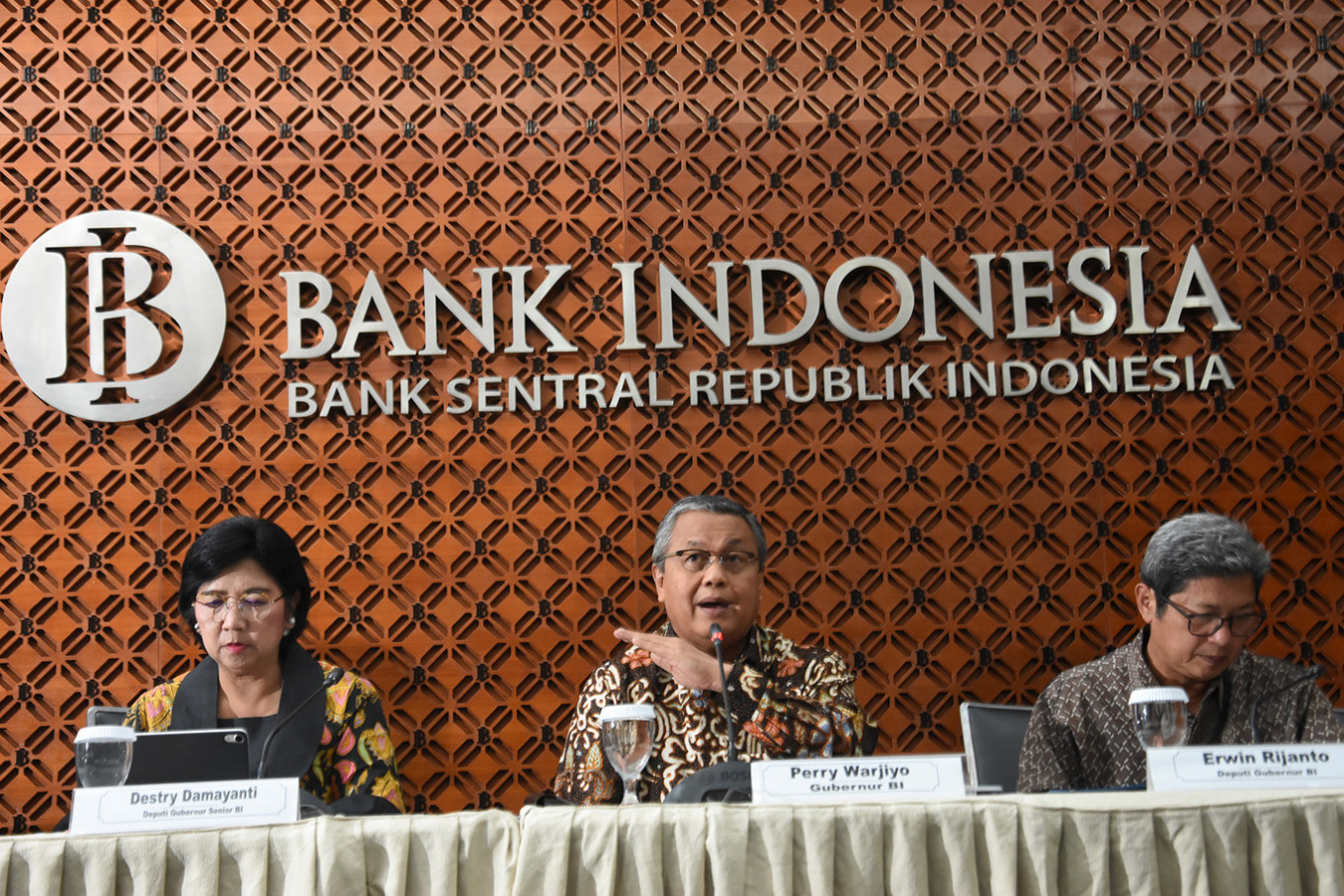Popular Reads
Top Results
Can't find what you're looking for?
View all search resultsPopular Reads
Top Results
Can't find what you're looking for?
View all search resultsBI cuts reserve ratio, frees up $3.2b liquidity in local banks amid market sell-off
Starting March 16, the requirement for banks to store their dollar funds at BI, called the US$ reserve requirement ratio (RRR), would be lowered to 4 percent from 8 percent at present.
Change text size
Gift Premium Articles
to Anyone
 Bank Indonesia Governor Perry Warjiyo (center) accompanied by Senior Deputy Governor Destry Damayanti (left), and Deputy Governor Erwin Rijanto, gave a press statement regarding policy measures to maintain monetary and financial stability due to the impact of the corona virus in the Bank Indonesia Building, Jakarta, Monday (2) / 3/2020). (Antara/Indrianto Eko Suwarso )
Bank Indonesia Governor Perry Warjiyo (center) accompanied by Senior Deputy Governor Destry Damayanti (left), and Deputy Governor Erwin Rijanto, gave a press statement regarding policy measures to maintain monetary and financial stability due to the impact of the corona virus in the Bank Indonesia Building, Jakarta, Monday (2) / 3/2020). (Antara/Indrianto Eko Suwarso )
B
ank Indonesia (BI) has decided to lower bank reserve requirements to boost liquidity and stabilize the market amid heavy selling pressures in local financial markets as Indonesia reported its first cases of the coronavirus disease COVID-19.
Starting March 16, the requirement for banks to store their dollar funds at BI, called the US$ reserve requirement ratio (RRR), would be lowered to 4 percent from 8 percent at present. The rupiah RRR is also being lowered by 50 basis points (bps), but only for banks with clients engaged in export and import activities, starting April 1.
“Lowering the foreign exchange RRR will boost banks’ liquidity by $3.2 billion while lowering the rupiah RRR will support export and import activities,” BI Governor Perry Warjiyo told a news conference in Jakarta on Monday after President Joko “Jokowi” Widodo announced the first coronavirus cases in the country.
Perry explained that since the COVID-19 outbreak, exporters and importers were finding difficulties in not only distributing goods but also finding new markets as cities in China went into lockdown. The lower rupiah RRR is expected to create ample liquidity for banks to channel more affordable financing to exporters and importers in the country.
“We will meet with banks and push to ensure disbursement goes well. The policy starts on April 1, and is effective for the next nine months until further evaluation,” the central bank governor added.
Read also: BI continues to intervene in markets as foreigners sell Indonesian securities
Jokowi announced on Monday morning that two Indonesians had tested positive for COVID-19. The two people, a 64-year-old and her 31-year-old daughter, had been in contact with a Japanese citizen who tested positive in Malaysia on Feb. 27 after visiting Indonesia in early February. Worldwide, more than 84,000 people have been infected with the virus and more than 3,000 have died.
Global markets were roiled in sell-offs as $5 trillion was wiped off stock markets around the world in the worst week for global shares since the 2008 financial crisis. Last week, foreign investors sold off a net Rp 33.6 trillion (US$2.36 billion) in both bond and stock markets.
Over the week, the benchmark stock index, the Jakarta Composite Index (JCI), fell 7.3 percent to 5,452 and the rupiah depreciated by 4.1 percent to 14,234 per US dollar. Ten-year Indonesian government bond yields, which indicate investment risk, rose 35 basis points last week to 6.83 percent, the third biggest increase after Turkey and Russia.
Read also: Disappearing act: Market braces for volatile March after $2.4b vanishes in a week
BI has been buying government bonds (SBN) to support prices and stabilize the rupiah, with Perry estimating Rp 103 trillion worth of SBNs have been bought so far this year, Rp 80 trillion of which followed its assessment that COVID-19 may pose risks to Indonesia’s economy.
“The biggest buyer of government bonds month-to-date [February] is Bank Indonesia,” Mandiri Sekuritas head of fixed income research Handy Yunianto wrote on Feb. 28. “Onshore banks have also supported the bond market.”









